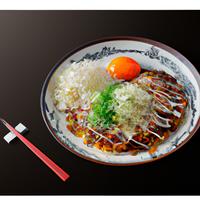
1 serving (250 grams) contains 550 calories, 20.0 grams of protein, 30.0 grams of fat, and 45.0 grams of carbohydrates.

Log this food in SnapCalorie

Nutrition Information
Calories |
518.9 | ||
|---|---|---|---|
% Daily Value* |
|||
| Total Fat | 28.3 g | 36% | |
| Saturated Fat | 9.4 g | 47% | |
| Polyunsaturated Fat | 0 g | ||
| Cholesterol | 56.6 mg | 18% | |
| Sodium | 1132.1 mg | 49% | |
| Total Carbohydrates | 42.5 g | 15% | |
| Dietary Fiber | 2.8 g | 10% | |
| Sugars | 4.7 g | ||
| protein | 18.9 g | 37% | |
| Vitamin D | 18.9 mcg | 94% | |
| Calcium | 75.5 mg | 5% | |
| Iron | 1.9 mg | 10% | |
| Potassium | 283.0 mg | 6% | |
* Percent Daily Values are based on a 2,000 calorie diet. Your daily values may be higher or lower depending on your calorie needs.
Food Attributes
Source of Calories
About Okonomiyake with pork
Okonomiyaki with pork is a savory Japanese pancake made with a batter of flour, eggs, grated yam, and finely shredded cabbage. "Okonomi" means "as you like it," reflecting its customizable nature, but the pork version typically includes thin slices of flavorful pork belly. Common toppings include a sweet-savory okonomiyaki sauce, Japanese mayonnaise, dried seaweed (aonori), and bonito flakes. Originating from Japan’s street food culture, it’s a filling meal with roots in Hiroshima and Osaka. Nutritionally, it delivers a balance of protein, fiber, and vitamins from the cabbage and pork, but it can be high in calories, sodium, and fat due to the toppings and fried preparation. Opting for leaner pork, minimizing toppings, or using whole-grain flour can make it a healthier choice while still preserving its bold and comforting taste.



